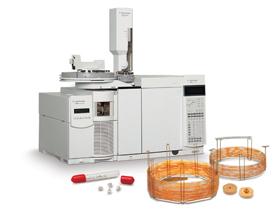GC TROUBLESHOOTING AND MAINTENANCE
TRAINING COURSE
A logical approach to GC Troubleshooting and Maintenance is explored in this one-day course. Commonly encountered problems and best practices are examined for all major system components including gas handling, inlet system, oven, column and detector.
Examination of separation chemistry, interrogation of poor peak shape and retention problems are a fundamentally important part of the course, leading to increased awareness of troubleshooting principles.
We limit numbers to 12 per course so that each delegate gets the opportunity to ask questions and fully participate in tutorial exercises.
When delivered on-site we can design the course material to suit your specific training needs.
This course is designed for those relatively new to GC and ideally will follow-on from attendance to the Fundamental GC training course.
GC TROUBLESHOOTING AND MAINTENANCE COURSE DETAILS
- How the chromatographic process takes place
- The architecture of a GC system
- Working principles and problems associated with each component of the system
- How to use chromatograms to troubleshoot chromatographic problems
- Best practices for column use and care
- Best practice in system maintenance and performance evaluation
We offer flexible delivery options for this instructor-led course:
- On-site: one full-day session at your laboratory or any location of your choice.
-
Online: two half-day interactive sessions.
View our online training calendar for upcoming dates.
Some previous knowledge of gas chromatography and basic experience are recommended but not essential.
-
Approaches to Logical Troubleshooting
- Logical troubleshooting
- System overview
- Component perspective
- Symptomatic perspective
- System maintenance records
- Symptom/Causes/Diagnosis & solution
-
Component Perspective
- What to look for/what can go wrong with…
- Injectors: on-column, split – splitless, large volume
- Detectors: FID, ECD, NPD, FPD
- Temperature and pressure control
-
Columns
- Installation and conditioning
- Operating principles
- Optimisation
- Operating range/bleed
- Band broadening
-
Symptomatic Perspective: Baselines
- Baseline spikes
- Noisy baselines
- Cycling baselines
- Rising/falling baselines
-
Symptomatic Perspective: Peaks
- No peaks
- Fronting/tailing peaks
- Split peaks/shoulders
- Broad shoulders
- Ghost peaks
- Retention stability
- Solvent incompatibility
- Loss of sensitivity
-
Maintenance
- Maintenance schedules
- Correct maintenance procedures injectors and detectors




